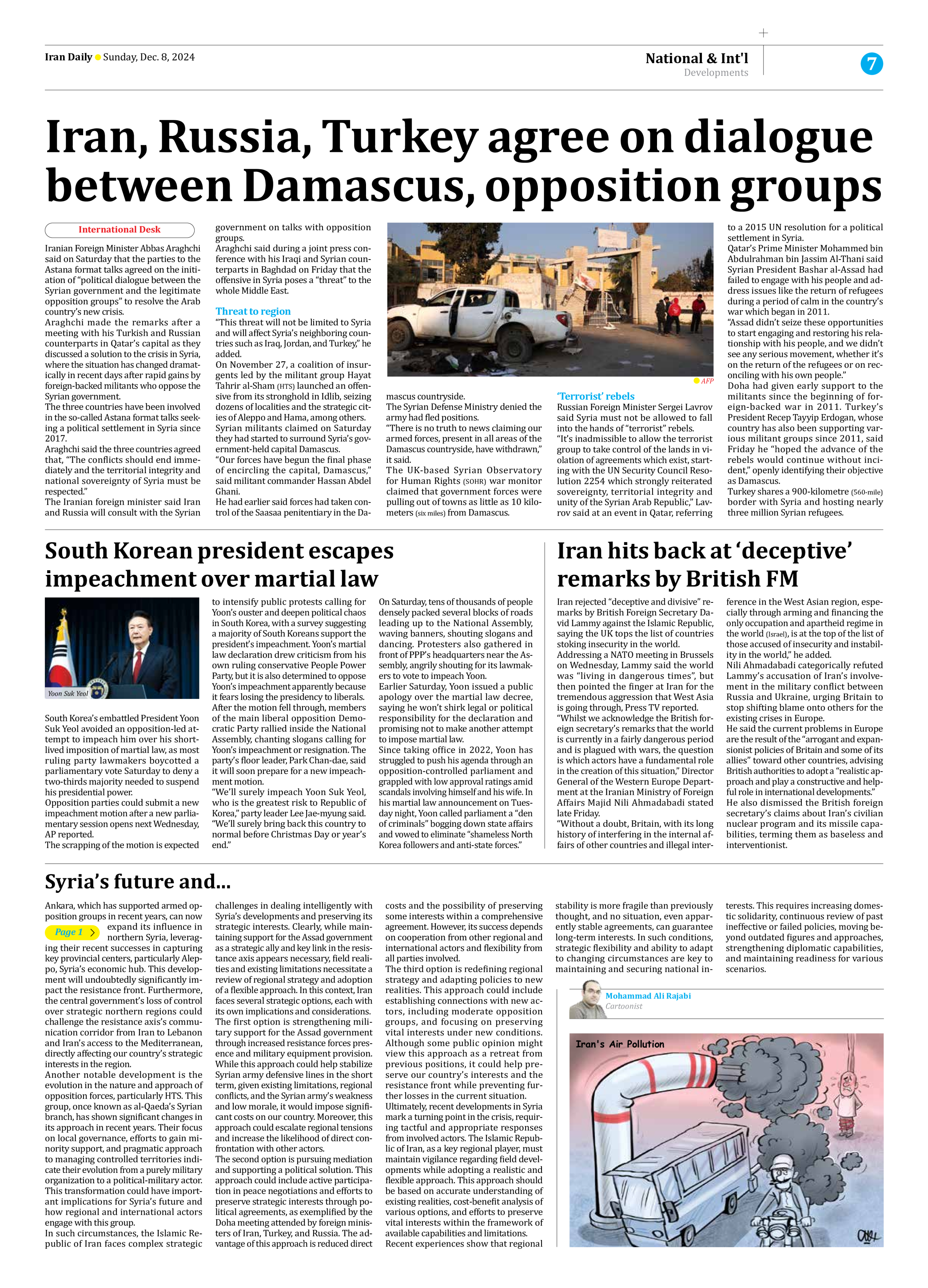
Iran, Russia, Turkey agree on dialogue between Damascus, opposition groups
Iranian Foreign Minister Abbas Araghchi said on Saturday that the parties to the Astana format talks agreed on the initiation of “political dialogue between the Syrian government and the legitimate opposition groups” to resolve the Arab country’s new crisis.
Araghchi made the remarks after a meeting with his Turkish and Russian counterparts in Qatar’s capital as they discussed a solution to the crisis in Syria, where the situation has changed dramatically in recent days after rapid gains by foreign-backed militants who oppose the Syrian government.
The three countries have been involved in the so-called Astana format talks seeking a political settlement in Syria since 2017.
Araghchi said the three countries agreed that, “The conflicts should end immediately and the territorial integrity and national sovereignty of Syria must be respected.”
The Iranian foreign minister said Iran and Russia will consult with the Syrian government on talks with opposition groups.
Araghchi said during a joint press conference with his Iraqi and Syrian counterparts in Baghdad on Friday that the offensive in Syria poses a “threat” to the whole Middle East.
Threat to region
“This threat will not be limited to Syria and will affect Syria’s neighboring countries such as Iraq, Jordan, and Turkey,” he added.
On November 27, a coalition of insurgents led by the militant group Hayat Tahrir al-Sham (HTS) launched an offensive from its stronghold in Idlib, seizing dozens of localities and the strategic cities of Aleppo and Hama, among others.
Syrian militants claimed on Saturday they had started to surround Syria’s government-held capital Damascus.
“Our forces have begun the final phase of encircling the capital, Damascus,” said militant commander Hassan Abdel Ghani.
He had earlier said forces had taken control of the Saasaa penitentiary in the Damascus countryside.
The Syrian Defense Ministry denied the army had fled positions.
“There is no truth to news claiming our armed forces, present in all areas of the Damascus countryside, have withdrawn,” it said.
The UK-based Syrian Observatory for Human Rights (SOHR) war monitor claimed that government forces were pulling out of towns as little as 10 kilometers (six miles) from Damascus.
‘Terrorist’ rebels
Russian Foreign Minister Sergei Lavrov said Syria must not be allowed to fall into the hands of “terrorist” rebels.
“It’s inadmissible to allow the terrorist group to take control of the lands in violation of agreements which exist, starting with the UN Security Council Resolution 2254 which strongly reiterated sovereignty, territorial integrity and unity of the Syrian Arab Republic,” Lavrov said at an event in Qatar, referring to a 2015 UN resolution for a political settlement in Syria.
Qatar’s Prime Minister Mohammed bin Abdulrahman bin Jassim Al-Thani said Syrian President Bashar al-Assad had failed to engage with his people and address issues like the return of refugees during a period of calm in the country’s war which began in 2011.
“Assad didn’t seize these opportunities to start engaging and restoring his relationship with his people, and we didn’t see any serious movement, whether it’s on the return of the refugees or on reconciling with his own people.”
Doha had given early support to the militants since the beginning of foreign-backed war in 2011. Turkey’s President Recep Tayyip Erdogan, whose country has also been supporting various militant groups since 2011, said Friday he “hoped the advance of the rebels would continue without incident,” openly identifying their objective as Damascus.
Turkey shares a 900-kilometre (560-mile) border with Syria and hosting nearly three million Syrian refugees.







